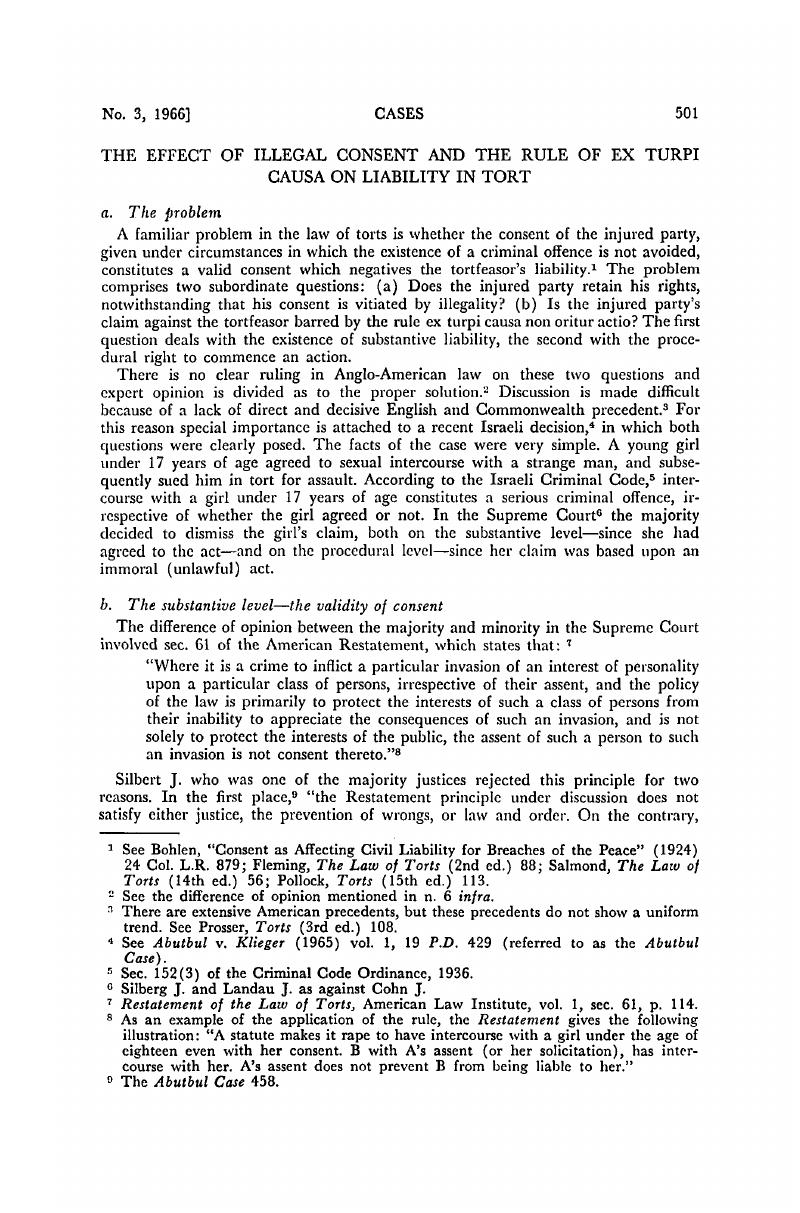No CrossRef data available.
Article contents
The Effect of Illegal Consent and the Rule of Ex Turpi Causa on Liability in Tort
Published online by Cambridge University Press: 12 February 2016
Abstract

- Type
- Cases
- Information
- Copyright
- Copyright © Cambridge University Press and The Faculty of Law, The Hebrew University of Jerusalem 1966
References
1 See Bohlen, , “Consent as Affecting Civil Liability for Breaches of the Peace” (1924) 24 Col. L.R. 879 Google Scholar; Fleming, , The Law of Torts (2nd ed.) 88 Google Scholar; Salmond, , The Law of Torts (14th ed.) 56 Google Scholar; Pollock, , Torts (15th ed.) 113.Google Scholar
2 See the difference of opinion mentioned in n. 6 infra.
3 There are extensive American precedents, but these precedents do not show a uniform trend. See Prosser, , Torts (3rd ed.) 108.Google Scholar
4 See Abutbul v. Klieger (1965) vol. 1, 19 P.D. 429 (referred to as the Abutbul Case).
5 Sec. 152(3) of the Criminal Code Ordinance, 1936.
6 Silberg J. and Landau J. as against Cohn J.
7 Restatement of the Law of Torts, American Law Institute, vol. 1, sec. 61, p. 114.
8 As an example of the application of the rule, the Restatement gives the following illustration: “A statute makes it rape to have intercourse with a girl under the age of eighteen even with her consent. B with A's assent (or her solicitation), has intercourse with her. A's assent does not prevent B from being liable to her.”
9 The Abutbul Case 458.
10 But why should the ex turpi causa rule not be applied here? See n. 48 infra.
11 Silberg J. bases this upon the marriage-age laws enacted by the Israeli legislature, which serve to supplement the provisions of sec. 152(3), which was also enacted by the Israeli legislature.
12 Ibid., 466.
13 Ibid., 471.
14 Ibid., 473.
15 Ibid., 474.
16 Ibid. The “blackmail” reason is also used by Fleming, op. cit. 88.
17 Ibid. Cohn J. quotes Pollock and Winfield in agreement.
18 Ibid., 453.
19 See n. 17.
20 Salmond, , Torts (10th ed.) 35.Google Scholar
21 Street, , Torts (3rd ed.) 76.Google Scholar
22 Ibid., 45.
23 It therefore seems to us, for instance, that a woman who willingly undergoes an abortion has no claim against the doctor who performed the abortion in a negligent manner. See also Fleming, op. cit., 89.
24 See Cheshire, and Fifoot, , The Law of Contract (5th ed.) 271.Google Scholar
25 The Abutbul Case 465.
26 See Davis, , “Plaintiff's Illegal Act as a Defence in Actions of Tort” (1904) 18 Har. L.R. 1088.Google Scholar
27 The Abutbul Case 462.
28 Landau J. did not express his opinion on this question.
29 Ibid., 446
30 See Aharonst v. Noiman (1956) 10 P.D. 1121.
31 See Gordon v. Chief Commissioner of Metropolitan Police [1910] 2 K.B. 1080, 1098.
32 See, for instance, Lord Mansfield's, remarks in Holman v. Johnson (1775) 98 E.R. 1120, 1121.Google Scholar
33 See Colburn v. Potmore (1834) 1 C & R 73; Askey v. Golden Wine Co. Ltd. [1948] 2 All E.R. 35.
34 See Southey v. Sherwood (1817) 2 Mer. 435; Glyn v. Weston Feature Film Co.
35 Inducement to breach contract (Cander Nominees Ltd. v. Forcey [1910] Ch. 352, 366); Assault (Hegarty v. Shine (1878) 14 Cox C.C. 145); Fraud (Askey v. Golden Wine Co. Ltd. [1948] 2 All E.R. 35); Negligence (Hillen v. I.C.I. (Alkali) [1934] 1 K.B. 455, 466).
36 See Colburn v. Potmore (1834) 1 C & R., 73.
37 See Barak, , “Occupier's Liability in the Law of Torts” Studies in Law in Memory of Abraham Rosental (1964) 104, 126 (in Hebrew).Google Scholar
38 See Rich v. Commissioner for Railways (1959) 33 A.L.J. 176.
39 This is the intention necessary for the constitution of criminal trespass, according to sec. 286 of the Criminal Code Ordinance; See Barak, op. cit.
40 This is the intention necessary for the constitution of stealing, according to sec. 263 of the Criminal Code Ordinance; see National Coal Board v. England [1954] A.C. 403, 428; Deane v. Claton (1817) 7 Tant. 489; Sarch v. Blackburn (1830) 4 C & P 297.
41 Compare Rosenfeld v. Jacobson (1963) 17 P.D. 1009.
42 See Askey v. Golden Wine Co. Ltd. [1948] 2 All E.R. 35.
43 See Dott v. Brickwell (1906) 23 T.L.R. 61.
44 See Burrows v. Rhodes [1899] 1 Q.B. 816; Strongman (1945) L.D. v. Sincock [1955] 2 Q.B. 525, 536.
45 See n. 38 supra.
46 See Henwood v. Municipal Tramways Trust (1938) 12 A.L.J. 101.
47 Substantiation for this presumption may be found in a line of decisions which reject the contention of ex turpi causa in cases commenced by servants against their masters, in which it was proved that the servant knowingly acted in contravention of safety precaution orders which were issued in order to protect the servant. See Cakebread v. Hopping Bros. [1947] K.B. 641, 654; National Coal Board v. England [1954] A.C. 403, 428; Williams v. Port of Liverpool Stevedoring Co. [1956] 1 W.L.R. 551; McMath v. Rimmer [1962] 1 W.L.R. 1.
48 See n. 40 supra.




